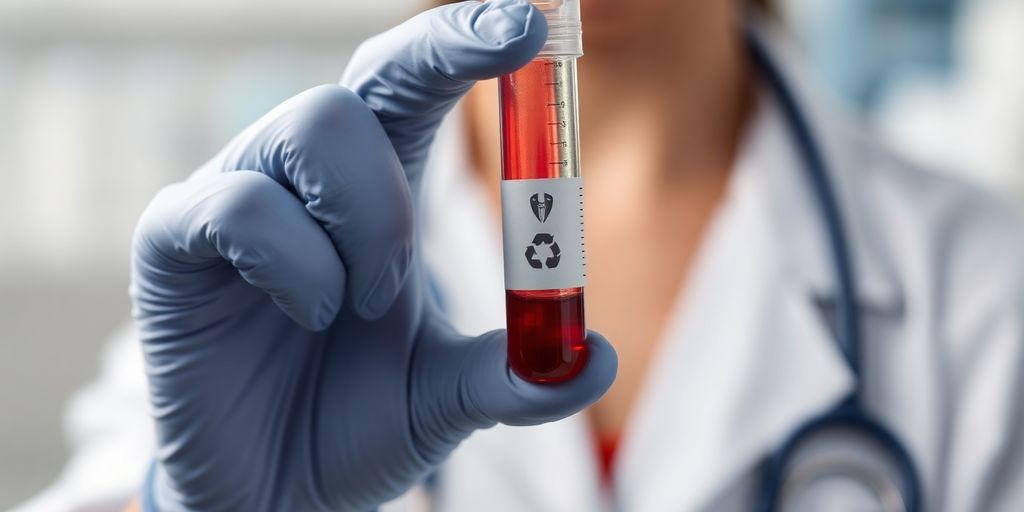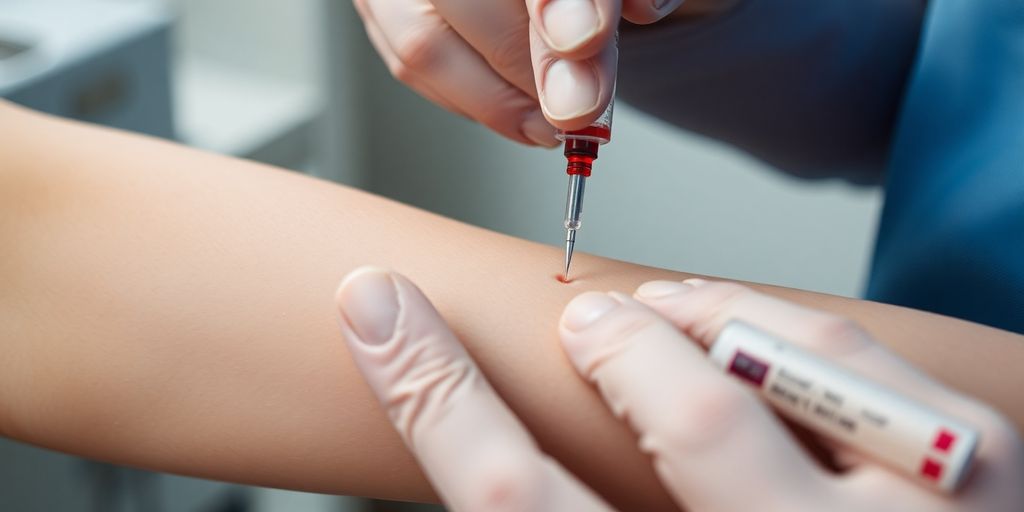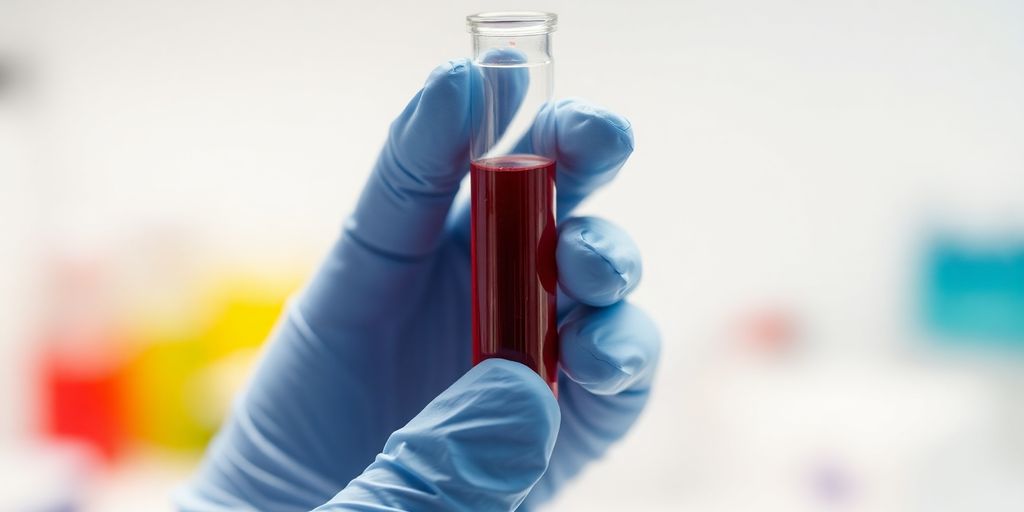Getting a syphilis blood test is a really important step for your health, and honestly, it’s not as scary as it might sound. Syphilis is an infection that can cause some serious problems if you don’t catch it early, but the good news is that it’s treatable. Knowing the basics about the syphilis blood test, why you might need one, and what to expect can make a big difference. Let’s break down what you need to know about this common test.
Key Takeaways
- A syphilis blood test checks your blood for antibodies that your body makes when it fights the bacteria that cause syphilis.
- You might need a syphilis blood test if you have symptoms, if a partner has syphilis, or if you’re in a high-risk group, including pregnant individuals.
- The test usually involves a simple blood draw from your arm, and there’s very little risk involved.
- Early detection through a syphilis blood test is key to preventing serious health complications and stopping the spread of the infection.
- You can get a syphilis blood test at your doctor’s office or through home care services, and scheduling is usually straightforward.
What Is a Syphilis Blood Test?
A syphilis blood test is a way for doctors to check if you have syphilis, which is a sexually transmitted infection (STI) caused by bacteria. It’s pretty common, and honestly, knowing about it is half the battle. The test basically looks for certain proteins in your blood called antibodies. Your body makes these antibodies when it detects something it thinks is harmful, like the bacteria that causes syphilis. It’s a straightforward way to get a clear picture of your health.
Understanding Syphilis and Its Symptoms
Syphilis is an infection that can spread through sexual contact, including vaginal, oral, or anal sex. It can also be passed from a mother to her baby during pregnancy. The tricky thing about syphilis is that it often doesn’t show obvious symptoms, especially in the early stages. When symptoms do appear, they can vary depending on the stage of the infection. Some common early signs might include a painless sore, often called a chancre, which can appear on the genitals, anus, or mouth. Later stages can involve rashes, fever, swollen lymph nodes, and even more serious issues affecting the heart, brain, and nerves if left untreated. Because symptoms can be so subtle or mimic other conditions, getting tested is really the only sure way to know if you have it.
How Blood Tests Detect the Infection
Syphilis blood tests work by detecting antibodies that your immune system produces in response to the Treponema pallidum bacteria, the culprit behind syphilis. Think of antibodies as your body’s defense team. When the syphilis bacteria enter your system, your immune system flags them and starts producing these specific antibodies. The most common screening tests, like the Rapid Plasma Reagin (RPR) test, look for a general marker called reagin, which your body often makes when syphilis is present. If this initial screening test comes back positive, it usually means a second, more specific test is needed to confirm the diagnosis. This confirmatory test looks for antibodies that are unique to syphilis itself. It’s a two-step process to make sure the results are accurate. You can find out more about these tests at trusted home care services.
It’s important to remember that even if you don’t have any symptoms, you could still have syphilis and potentially spread it to others. Regular testing is a responsible step for anyone who is sexually active, especially if you have multiple partners or engage in unprotected sex.
Why You Might Need a Syphilis Blood Test

Confirmatory Tests (Treponemal)
So, you’ve had a screening test, and it came back positive. What’s next? Well, a positive screening test doesn’t automatically mean you have syphilis. It just means your body has developed antibodies that might be from a syphilis infection. To be sure, your doctor will likely order a second, more specific test. These are often called confirmatory or treponemal tests. They look for antibodies that your immune system specifically makes to fight off the syphilis bacteria. If these are present, it confirms you either have an active infection or had one that was successfully treated in the past. Sometimes, instead of looking for antibodies, a provider might use a test that directly detects the syphilis bacteria, though these are less common and require special labs.
High-Risk Situations and Populations
Even if you’re not showing any symptoms, there are certain situations where getting tested for syphilis is really important. If you’re sexually active, especially with multiple partners, or if your partner has multiple partners, your risk goes up. Having unprotected sex, or having an HIV infection or another sexually transmitted disease like gonorrhea, also puts you in a higher-risk category. For men who have sex with men, regular testing is also recommended. If you fall into any of these categories, it’s a good idea to talk to your doctor about how often you should get tested.
Pregnancy is another big one. If syphilis isn’t treated during pregnancy, it can cause serious, even deadly, problems for the baby. That’s why it’s recommended that all pregnant individuals get tested at their first prenatal visit. Depending on your risk factors, your doctor might suggest another test later in the pregnancy or even at delivery. It’s all about catching it early to protect both you and your child. If you’re looking for a convenient way to get tested, consider at-home blood testing services.
How the Syphilis Blood Test Is Performed
Preparation Before the Test
Good news here: you generally don’t need to do much to get ready for a syphilis blood test. Unlike some medical procedures, there aren’t specific dietary restrictions or fasting requirements. Just show up for your appointment. If you’re getting a different kind of test done at the same time, like a spinal tap, your doctor might give you specific instructions, but for the blood draw itself, it’s usually straightforward.
What to Expect During and After Testing
So, what actually happens when you get tested? For a standard syphilis screening procedure, a healthcare professional will draw a small amount of blood, usually from a vein in your arm. You might feel a little pinch or sting when the needle goes in, and maybe a slight ache afterward, but it’s typically very quick. Bruising at the site is possible but usually goes away fast. After the blood is collected, it’s sent off to a lab for analysis. The whole process is pretty low-risk. If you’re curious about at-home options, some kits let you collect your own blood sample to mail in, but remember, these are usually just screening tests and will need confirmation.
Interpreting Your Syphilis Blood Test Results
Understanding syphilis test results can seem a bit confusing, but your doctor will walk you through it. The initial test, often called a screening test like the RPR or VDRL, looks for antibodies your body makes in response to syphilis. If this screening test comes back negative, it usually means you don’t have syphilis, though it’s possible antibodies haven’t developed yet if you were recently exposed. A positive screening result means antibodies were found, but it doesn’t automatically mean you have syphilis. It indicates you need a second, more specific test to confirm. This confirmatory test looks for antibodies that are more uniquely tied to syphilis. If both tests are positive, it confirms an infection, either current or past. If you get a positive result, it’s important to discuss treatment options with your healthcare provider and inform any sexual partners so they can get tested too. Getting tested is a key step in managing your health and preventing the spread.
Benefits of Getting a Syphilis Blood Test
Getting tested for syphilis might not be the most fun thing to think about, but honestly, it’s a really smart move for your health. Knowing if you have syphilis early on makes a huge difference in how it’s treated and what happens down the road. Early detection is the name of the game when it comes to syphilis. If it’s caught early, treatment is usually pretty straightforward with antibiotics, and you can avoid a lot of the really nasty long-term problems that can pop up if it’s left untreated. We’re talking about things like serious heart issues, nerve damage, or even blindness. Plus, getting tested is a way to look out for the people you’re close to. If you do have syphilis, telling your partners means they can get tested and treated too, stopping the spread and keeping everyone healthier. It’s a responsible step that shows you care about your own well-being and the health of those around you. It’s really about taking control and making informed decisions about your sexual health. Don’t put it off; knowing your status is a big step toward staying healthy.
Early Detection Prevents Complications
When syphilis is found early, treatment is usually very effective. Antibiotics, often penicillin, can clear the infection before it causes lasting damage. Without treatment, syphilis can progress through stages, affecting various parts of your body, including your brain, nerves, eyes, heart, and bones. Catching it early means you can stop these serious health problems before they even start. It’s much easier to treat syphilis in its primary or secondary stages than it is to manage the complications that can arise in the later, latent, or tertiary stages. Regular testing, especially if you’re sexually active, is key to this early detection.
Protecting Yourself and Your Partners
Getting a syphilis blood test isn’t just about you; it’s also about protecting the people you’re intimate with. If you have syphilis and don’t know it, you could unknowingly pass it on to your partners. Once diagnosed, you can take steps to inform them so they can get tested and treated. This breaks the chain of transmission and prevents further spread of the infection within the community. It’s a responsible action that contributes to overall public health. Remember, if you’re diagnosed, it’s important to avoid sexual contact until your healthcare provider says you’re cured.
Knowing your status is a powerful tool. It allows you to make informed decisions about your sexual health and take proactive steps to prevent the spread of infections. Don’t let fear or embarrassment prevent you from getting tested. It’s a simple procedure that can have significant positive impacts on your health and the health of your partners.
Where to Get a Syphilis Blood Test

Trusted Home Care Services
When it comes to your health, convenience and trust are super important. You can get a syphilis blood test through various home health care services. These places often have nurses or phlebotomists who can come to your home to collect the sample. This is a great option if you’re busy, have mobility issues, or just prefer the comfort of your own space. They usually handle sending the sample to a lab and getting the results back to you or your doctor. It’s a really straightforward way to take care of this important health check. You can often schedule appointments online, and some services even let you upload lab requisitions if your doctor has already ordered the test. Getting tested regularly is key to staying healthy.
How to Schedule Your Test and What to Prepare
Scheduling a syphilis blood test is usually pretty simple. Most home health care providers have online forms or phone numbers you can use. When you book, they’ll ask for some basic info like your name, contact details, and maybe the type of service you need. As for preparation, it’s generally minimal for a standard blood test. You typically don’t need to fast or do anything special beforehand. Just make sure you’re hydrated, as that can make drawing blood a bit easier. If your doctor has given you specific instructions, always follow those, but for most routine syphilis blood tests, it’s a breeze.
Take Control of Your Health with a Syphilis Blood Test
Knowing your status is a big step in managing your sexual health. Syphilis is treatable, especially when caught early, so getting tested is a proactive move. It’s not just about you, either; it’s about protecting your partners too. Regular testing, especially if you’re sexually active or have multiple partners, is a responsible choice. Don’t put it off – taking charge of your health is always the right decision.
Contact A+ Home Care to Schedule Your Test Today
Ready to get tested? Reaching out to a service like A+ Home Care makes it easy. They focus on providing reliable and discreet testing services right at your doorstep. You can easily schedule your appointment and get the peace of mind that comes with knowing your health status. Don’t wait, take that step today!
Wrapping Up: What to Remember About Syphilis Tests
So, getting tested for syphilis is a pretty straightforward process, usually just a blood draw. If your test comes back positive, don’t panic. It just means your body has antibodies that might be from syphilis, and your doctor will likely do another test to be sure. If it’s confirmed, treatment is usually pretty effective, especially if caught early. The most important thing is to talk openly with your doctor about any concerns you have and to let any sexual partners know so they can get tested too. Early detection and treatment really make a big difference in managing syphilis and preventing any long-term issues.
Frequently Asked Questions
What exactly is a syphilis blood test?
A syphilis blood test checks your blood for signs that you might have syphilis, which is a sexually transmitted infection (STI). It looks for special proteins called antibodies that your body makes when it fights off the syphilis germ. It’s a really important test because syphilis can cause serious health problems if not treated early.
How does the test work to find syphilis?
Usually, the first test is a screening test to see if you have antibodies that could mean syphilis. If this test comes back positive, your doctor will order a second, more specific test to be sure. This second test confirms if you actually have syphilis or if the first result was a false alarm. Sometimes, they might even look for the germ itself, but that’s less common.
What should I do to prepare for the test?
You don’t need to do much to get ready for a syphilis blood test. Just make sure to tell your doctor about any symptoms you’re having or if you think you might have been exposed. They’ll draw a small amount of blood from a vein in your arm, which is usually quick and might cause a tiny pinch or bruise.
What do the results of the test mean?
If your test is negative, it likely means you don’t have syphilis. But remember, it can take a little while for your body to make enough antibodies to show up on a test. So, if you think you were recently exposed, your doctor might suggest another test later. If it’s positive, it means you have the antibodies, and your doctor will likely do another test to confirm it and discuss treatment.
Why is it so important to get tested for syphilis?
Getting tested is super important because syphilis is easiest to treat when caught early. Early treatment can stop it from causing long-term damage to your body, like problems with your brain, heart, or eyes. Plus, knowing if you have it helps you protect your partners from getting infected, too.

